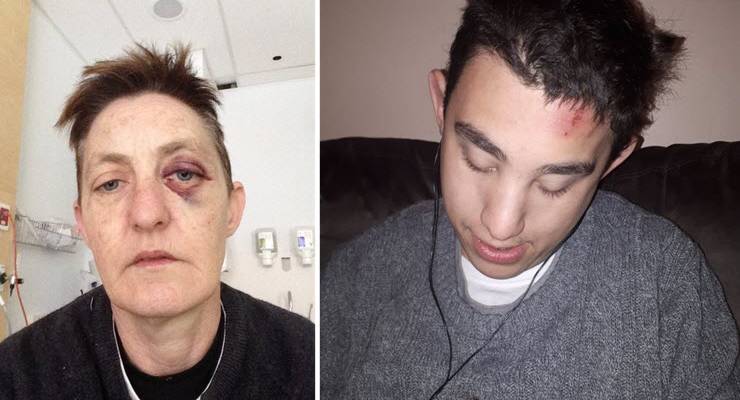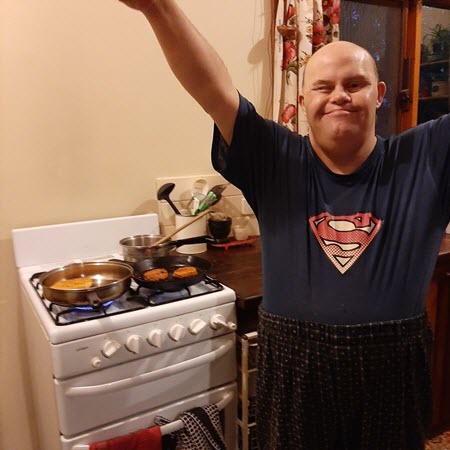
This article discusses allegations of abuse, violence, neglect and sexual assault of people with disabilities, and suicide.
The National Disability Insurance Scheme’s (NDIS) regulatory body, the Quality and Safeguards Commission — often, the last line of defence for people with disabilities — is so overburdened with complaints and reports, that allegations of abuse, neglect, sexual assault and rape go un-investigated.
The commission is overwhelmed. More than 10,000 cases are submitted every month on average and staff are walking off the job in tears.
The commission has powers to issue sanctions and ban providers who put people with disabilities at risk, but since its inception in 2018 just 22 providers have been banned.
An Inq investigation has revealed:
- A 52-year-old woman became underweight, malnourished, injured and possibly assaulted while staying in supported living accommodation
- A young man’s head injury was left unreported and untreated by his carers
- A non-verbal man was moved out of his group home and left in hospital without his family’s knowledge
- Each case was reported to the commission and dismissed. No providers were punished
- The commission received more than 71,000 cases in six months but employed just 187 staff.
Head injuries, assault and neglect ignored
Six months into her 2018 stay at assisted living accommodation with disability service provider Achieve Australia in Sydney’s north, Georgi Hadden, 52, had become malnourished, underweight and suicidal. She had been sleeping on a mattress on the floor.
Hadden said she was found unconscious after a suicide attempt, naked from the waist down with a black eye and bruises all over her face and torso.
Neither the hospital nor Achieve Australia investigated the incident. The NDIS Quality and Safeguards Commission dropped her complaint when Hadden moved out of the accommodation.
Hadden still doesn’t know what happened that night.
At another service provider, James Wheatley, who is non-verbal, came home from respite care with a large head injury. His support worker told his mother she hadn’t noticed the lesion, and the facility didn’t submit an incident report — as is required under the NDIS code of conduct — to the commission.
A complaint lodged by his mother was dismissed, with no criminal investigation launched into what happened to her son.
For 16 hours, RG’s* family had no idea where he was. RG has Down syndrome, autism, epilepsy and memory loss. He needs an aid to help him communicate.
His group home sent him to hospital when he became aggressive and then refused to take him back, leaving him homeless. His family had to fly in from interstate last minute.
The commission dismissed the complaint.

Regulator overwhelmed and under-resourced
Former employees at the commission told Inq that staff members had walked off the job in tears. Others said staff had been told to favour companies over people with disabilities when investigating a case.
By June 2019 — the latest figures available — the commission employed 185 ongoing staff. Of those, 113 were in NSW. In the last six months of 2019, the commission received more than 71,000 complaints and reportable incidents.
Federal MP Rebekha Sharkie estimates that fewer than 1% of cases are escalated to the investigations team to be analysed in South Australia, with allegations of rape and sexual assault ignored.
The commission can issue compliance orders, forcing a provider to change their practice, and ban providers from being able to register with the NDIS. These powers are seldom used.
A commission spokesperson acknowledged it had a high caseload but wouldn’t comment on individual complaints. Some incident reports are multiple notifications of the same issue.
They said if an incident involved allegations of harm to a person with a disability, it was immediately assessed, and criminal allegations were referred to the police. Complaints are closed if the commission believes a provider is meeting their registration and conduct obligations.
They also said some participants choose to change services, rather than lodge a complaint.
As to the question of staffing: “Staffing levels are determined within the allocation available to the agency.”
Last year, the commission recorded an operating surplus of $4.7 million due to savings in employee benefits expenses. It was allocated almost $55 million in the latest budget.
Opposition spokesperson for the NDIS Bill Shorten told Inq that not enough was being done to protect people with disabilities.
“We have grave concerns successive Liberal governments have allowed the disability watchdog to become a toothless purse poodle,” he said.
“Tragic deaths like Ann Marie Smith and constantly-emerging other cases reveal a cultural problem of reluctance to properly monitor or investigate dodgy providers.”
Will an inquiry help?
A federal inquiry and a joint standing committee inquiry into the NDIS Quality and Safeguards Commission are both currently underway.
The federal inquiry is focusing on the circumstances relating to the death of Ann Marie Smith, a South Australian woman who was left soiled and neglected in a cane chair.
The joint standing committee’s inquiry will look at the efficacy and resourcing of the commission. Submissions closed at the end of July. No media releases into the inquiry have been published. Several disability advocates Inq spoke to only became aware of the inquiry through friends on social media.
There have been questions raised around what another inquiry will achieve. Public sector staff have been anonymously submitting their experiences through their union.
Under-resourced, underfunded and overburdened, the NDIS Quality and Safeguards Commission deals with complaints and reportable incidents slowly and ineffectively, with a reluctance to punish non-compliant providers.
In a way, Hadden, Wheatley and RG were all fortunate: they were able to advocate for themselves or had loving family members to do so on their behalf.
But, despite being the fortunate few who can navigate the complexities of the NDIS Quality and Safeguards Commission, their experiences were still dismissed. People with disabilities continue to have allegations of neglect and abuse swept under the rug.
*Surname withheld for privacy
Next: How the NDIS Quality and Safeguards Commission works








No surpises here, sadly. In common with the failures of many other regulatory bodies, the legislation is there, but the will to enforce and punish is not. Disgraceful.
Exactly. There are common threads found in so many regulatory agencies it should be termed the Australian Regulatory Model:
# Set up an agency which, on the face of it, has at least some regulatory standards to enforce.
# Make it “under-resourced, underfunded and overburdened”
# Recruit staff who do not have an enforcement background or culture so they are naturally reluctant to use the enfoprcement powers they have – typically they are from the industry they regulate so they will be naturally sympathetic and forgiving to those they should regulate. If they do have the gumption to attempt serious enforcement they still lack the competence and experience necessary.
# Confuse the regulatory role by adding an advisory or educational function. This not only diverts resources from regulation, it creates a conflict of interest because, once the regulator has provided advice / education, the regulator is implicated if things later go wrong – so the regulator will be even less likely to use enforcement.
# The relevent minister ensures the agency is under control of individuals who know their minister requires ‘light touch’ regulation i.e. no enforcement unless it is absolutely unavoidable.
# The regulator is required to consult and take note of input from ‘stakeholders’, which means those being regulated and never those who suffer if the regulated fail to meet their standards.
All this ensures regulatory agencies are not just ineffective, they are inevitably subject to severe regulatory capture, i.e. the regulator believes its objective is to serve the interests of the regulated.
It would be good to have a Royal Commission into the systemic failure of regulatory agencies in Australia, but, like a federal corruption and crime commission, our politicians would never permit it because they obviously prefer things as they are.
Agree SSR. Am now member of Aged Care cohort myself. Retired. Professional life: The whole gamut. Children, dysfunctional- criminalised youth, disability, aged . . and Education. Senior Management forty plus years.
Focus! Enquiry after Enquiry. Brutality, abuse, misconduct et al. A failure to focus upon correct catalyst. “The person or Thing that causes a “change.” There will always be victims but rarely structural scrutiny, financial corrections. Whether it be ‘disabled’ persons, ‘aged’ persons, dysfunctional youth or disturbed, abused children. Always public media steered by those seeking political / financial gain. Human need to accuse, penalize. Blame and accountability. The real, truthful reason(s) driving or stalling “cause and change.”
Consequence. Very little ever changes as each victim / perpetrator outcome diverts from the real focus leading to ‘change’. The undeniable truth is . . . the disabled, aged are not highly valued cohorts. In fact, other than immediate family, relation(s), we in community are led by bureaucrats, politicians, corporates who rate individuals similar to commodities, more likely to ‘cost’ community than valued within community.
Remember the recent ‘BANKING ENQUIRY’?
Just as with aged care, despite it being a government-funded program, the services are not being properly supervised and audited. And the move to a ‘choice’ model from (mostly) reputable and experienced disability services hasn’t helped.
Just like the bank B/S re the “Tough cop on the block” – whenever another bandaid (sic!) is required for a systemic problem of the System, the usual suspects are commissioned, terms of reference so weak as to be risible and no power to enforce – will to do so not even being on the horizon.
Now, about that climate change thingy….
Thank you for investigating this and writing this article. It is only through media attention that this sort of government failure gets any airtime. Aged care, disability, child protection, family violence, aboriginal incarceration and deaths in custody, social housing, public health, mental health, addiction all consistently and chronically underfunded with severe systemic issues. As I have two children with severe autism myself, I can only hope the system improves as I get older and less able to care for them myself. Thank you again for highlighting the issue.
In the UK I feel that the Care Quality Commission (CQC) is more concerned with record keeping than the quality of care delivery, but on reading this article about the Australian, National Disability Insurance Scheme’s (NDIS) regulatory body, it is clear that our CQC is way above that of your NDIS in looking at issues of abuse and safeguarding.
That does not mean that our CQC could not do more, because it could, but on dealing with abuse and safeguarding issues there should be a Zero tolerance and therefore there is always more that could be done.
No one should have to put up with abuse, but unfortunately not everyone is willing to treat others with dignity and respect and it is because of these people that any Body with the responsibility to monitor the quality of care should do so to ensure that good quality care is there for everyone.